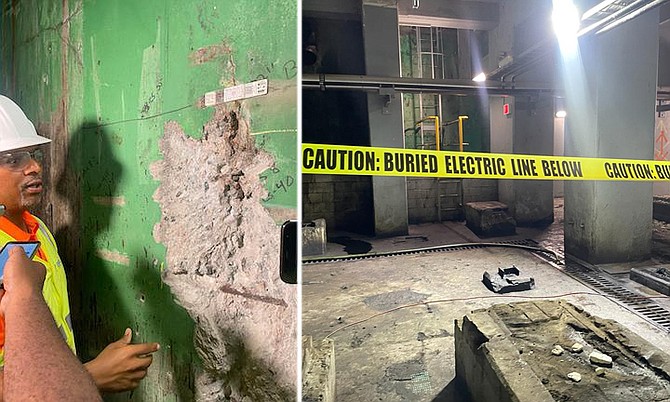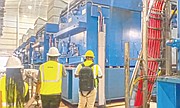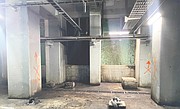BPL’s director of energy supply, Anthony Christie (pictured), said when his team took over operations of Station A, which houses the Wartsila engines, they encountered numerous problems, some of which affected their ability to maintain the machines. Photos: Leandra Rolle
By LEANDRA ROLLE
Tribune Staff Reporter
lrolle@tribunemedia.net
BAHAMAS Power and Light officials led reporters on a tour of the Clifton Pier power plant yesterday, showing how the young Wartsila engines are surrounded by old infrastructure, impacting the efficiency of the machines.
BPL’s director of energy supply, Anthony Christie, said when his team took over operations of Station A, which houses the Wartsila engines, they encountered numerous problems, some of which affected their ability to maintain the machines.
He said the building was poorly ventilated.
“When you have such high ambient temperatures in the building, you have restrictions on the unit, so a unit might be designed to do 18 megawatts, and it can only do 15 because of the high temperatures,” he said. “So, we have to cool this building in a better way.”
He said BPL plans to install exhaust fans to help cool the temperatures inside the station.
He said certain areas in the facility, including the plant’s basement, were substandard and had equipment that did not work.
“The (basement) floor was pretty much full of oil or water in a large amount of areas,” he said. “Proper pumping systems were not working down there and that was the first area which we literally focused on to clean up in order to make it safe for staff to go down there.”
During yesterday’s tour, the corroded walls and roofs in the basement were apparent. The Wartsila engines are located upstairs, atop springs bolted onto concrete pedestals. Officials said the vibration of the units caused the walls in that area to crack.
“You have the vibration, you have corrosion, you have temperatures, all of that impacts what is happening to the structure itself,” Mr Christie said.
“And again, this building is aged. It's very much 40 years plus in age. It would’ve had a lot of impact.”
BPL CEO Shevonn Cambridge previously said the Wartsila engines were designed to be installed within a new building. However, officials changed the plan after a significant fire at the plant in 2018.
Mr Christie said: “If someone asked me what we would’ve done, I think we would’ve wanted to have seven units installed in a new building.”
“We would’ve wanted to have a new boiler. We would’ve wanted to have new separators. We would’ve wanted to have a new incinerator system, etc. So, a lot of things that should’ve been done in the inception, which may have caused a little more money or extended the time in which they would’ve been online, that would’ve helped us and put us in a better condition to date.”
Mr Christie identified issues with the design of the Wartsilla engines.
“We would’ve found bolts that snap or break,” he said. “We’ve had more wear and tear on certain components in the crankcase, etc, that needed proper analysis in order to understand the root cause, so it was not a straightforward overhaul as we had planned or envisioned, and that’s why it would’ve taken us a longer time to complete those and we’re still in the process of doing that.”
Mr Christie said despite the challenges, workers do not feel overwhelmed.
"I think the demand may have put more pressure on us,” he said. “We've had, in July, the highest peak we've ever recorded. We anticipate normally to have peaks in August, September. We saw that a bit earlier, so when we have that happen, and again, we may have issues unplanned happen, then that impacts us, but we're not overwhelmed. I think we have enough expertise on the ground."







Comments
Use the comment form below to begin a discussion about this content.
Commenting has been disabled for this item.